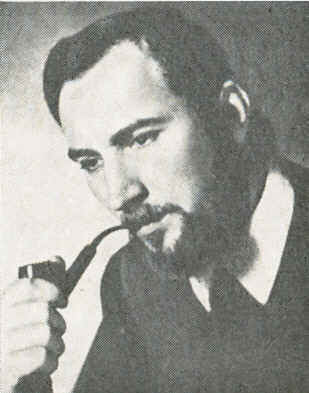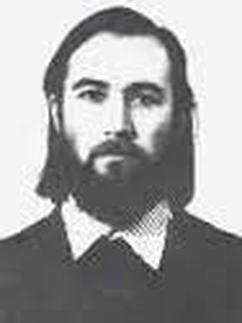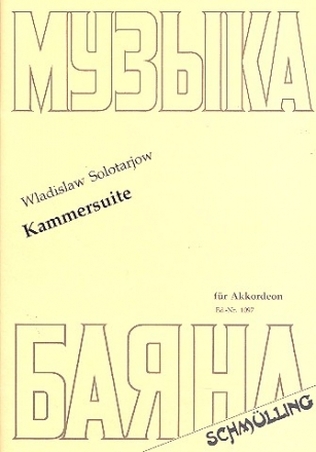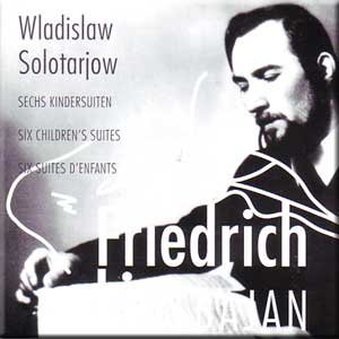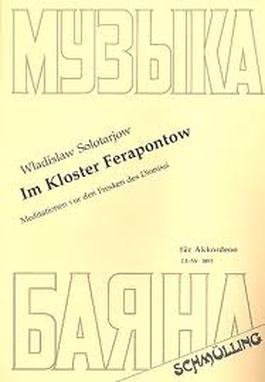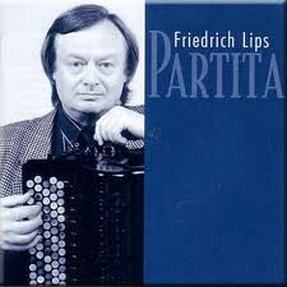Zolotaryov Vladislav (1942 - 1975)
|
The first years of his life Zolotaryov spent in the village of De Castries Bay Khabarovsk Krai in the far east of the USSR, which was an important military base. In 1947 the family moved to Gudauta an Abkhazia, where he saw for the first time in his life war refugees, which he would remember for the rest of his life, and where he caught malaria. In 1948 they moved to Ust-Nera, the coldest region of the northern hemisphere. In 1953 they settled in Yessentuki in the North Caucasus, but in 1955 they returned again to Ust-Nera.
Being a child, Zolotaryov spent a lot of time in nature and listened to the songs and stories of his grandmother, which were an inspiration for his later compositions. In 1953 he got his first accordeon from his father, who also gave him the basic lessons to play the instrument. As Vladislav was not trained professionaly until he was 16, he played by ear and improvising. In 1958 the family Zolotaryov moved to Magadan on the banks of the Sea of Okhotsk. This city would play an important role in the life of Vladislav. In Magadan, the capital of Kolyma, had been the largest so-called forced-labor camp of the Soviet Union. There he saw the camp buildings for the former prisoners, there was the barbed wire, there were the destroyed barracks, guard towers. As Zolotaryov was a very sensitive person, he would remember these impressions for the rest of his life. |
In 1960 Magadan opened a School of Music and Zolotayov was one of the first students. There he studied accordeon, transcription and arrangements of folk songs. But very soon this program would cease to meet him: in addition he constantly engaged himself reading works of world literature and philosophers, analysing the music he listened to during houres, ...
From the very start of the course at that school, Zolotaryov wrote music. His first works were two duets: for violin and piano and for accordeon and piano. He had hoped that composing for other instruments, together with his knowledge of symphonical music would help him to find new playing techniques and a new language for accordeons.
From the very start of the course at that school, Zolotaryov wrote music. His first works were two duets: for violin and piano and for accordeon and piano. He had hoped that composing for other instruments, together with his knowledge of symphonical music would help him to find new playing techniques and a new language for accordeons.
|
In 1963, in the city of Magadan, Zolotaryov met the concert accordeonist Yuri Kasakov. He saw the multi-timbral, free bass accordeon, which Kasakov presented to the public and realised the future of this instrument. Zolotaryov intended to continue his studies in Leningrad, but instead he had to return to the Far East of the Soviet Union for military service.
The three years he had to serve the army, were very difficult for Zolotaryov. His distinct personality was constantly in conflict with the army orders and one of the regular punishments was that he was forbidden to write music. It was during such a period that he wrote the soldiers' songs, for which he even got prizes. His correspondence, for example with the accordeon teacher Yuri Grogorevich, helped him through this difficult period. In the army Zolotaryov read a lot: world literature and books about music and philosophy. He wrote a brochure about realism in art and in spite the fact that he had to do with very little music, he developed through reading, the new thoughts which helped him to develop an individual musical language. The book "Doctor Faustus" from Thomas Mann pointed him to the twelve-tone composition of Shönberg, whose work was hardly heard in the Soviet Union. Also Chopin was important to him, as he saw in this composer the embodiment of subjectivity, which was contrary to the ideology of the Soviet Union, in which Zolotaryov couldn't find himself. |
During his time in the army Zolotaryov thought a lot about the bayan and its music, which he considered one-sided and primitive. In his view it was an option to play polyphonic on the instrument. In this period he wrote Piano Concerto no 1 for accordeon and symphonical orchestra.
Zolotaryov had had the intention to move to Moscow, after his graduation from college, but as his demobilisation was delayed untill 1966, due to the war in Vietnam, he couldn't realise his plan. After returning from the army, he even was going to get out of school, because he thought the army had had a very bad influence on his musical training. At that moment he got a high-quality, multi-timbral free bass accordeon from his parents. Zolotaryov was delighted and started experimenting and writing such works, which require a free bass, multi-timbral instrument. He overcame the monotonous accompaniment form that was typical for the bayan repertoire before. His Symphonical Suite is one of the earliest works for bayan of that kind in history of music. As Zolotaryov lived far away from the Union of Composers and Moscow, he could freely work on a new musical language for the accordeon.
Zolotaryov had had the intention to move to Moscow, after his graduation from college, but as his demobilisation was delayed untill 1966, due to the war in Vietnam, he couldn't realise his plan. After returning from the army, he even was going to get out of school, because he thought the army had had a very bad influence on his musical training. At that moment he got a high-quality, multi-timbral free bass accordeon from his parents. Zolotaryov was delighted and started experimenting and writing such works, which require a free bass, multi-timbral instrument. He overcame the monotonous accompaniment form that was typical for the bayan repertoire before. His Symphonical Suite is one of the earliest works for bayan of that kind in history of music. As Zolotaryov lived far away from the Union of Composers and Moscow, he could freely work on a new musical language for the accordeon.
|
Zolotaryov presented his works in recitals he gave at the school in Magadan. With his performances he captured the aucience, as he played at a high technical level and it was clear that he handled the instrument in a new way, as if the music was written for orchestra.
In 1967, Zolotaryov participated in the Far East Competition in Vladivostok, playing only pieces of his own. The members of the jury didn't understand his music and even made fun of it. Also in Mahadan only few musicians understood his advanced works, such as Partita, but they supported him and performed his works. Meanwhile Zolotaryov continued self-education in a very intense way. It became a habit to stay up all night, with candles and completely dressed in black, this to achieve a special mood. During these nights Zolotaryov studied western composers and progressive Russian composers. For his final examination at the school in June 1968, Zolotaryov gave a performance with pieces from Bach, Buxtehude and Mussorgsky. His playing was of such a level that he was advised to go to the conservatory. But Zolotaryov decided to go on as an accordeon teacher in Providence Bay in Chukotka, so that he could also compose music. In 1969 Zolotaryov met the accordeon player Mitchenko in Magadan. Mitchenko was delighted with the compositions Zolotaryov had shown him and took several pieces with him to Moscow, to use them in concerts. Especially Partita caused a kind of revolution in the world of bayan-culture, after the first performance in Moscow, in October 1970. The music didn't leave the audiance indefferent, as they understood this was a new beginning in the bayan repertoire. Children's Suite and Partita were soon recorded on plate. |
|
For a short time Zolotaryov moved to Moscow, together with his wife Irene, in 1971, but in winter he returned to Magadan, where he finished Sonata no 2, which was ordered by F. Lips. Zolotaryov went on sleeping very little in order to be able to write his music. He even started to flagellate himself, meaning that this could prevent himself from sleeping. He desired to return to the Far East, where the nights were so clear and strong that they could be an inspiration for him.
Thanks to his friendship with Lips he wrote several pieces which were an enrichment for bayan-culture. Also new composers started to write in his way: S. Gubaidulina and E. Denisov. In autumn 1971 Zolotaryov was accepted by the composition faculty of the Moscow Conservatory. During this studies Zolotaryov wrote works which were performed at the conservatory. He always worked on his pieces for a very long time mentally, while it took him a short time to write them down. He also went on with his self-education, while he got lessons from Shostakovich and Shchedrin and advise from Volkov. Khrennikow, who had headed the Union of Composers for years, was the professor of Zolotaryov at the conservatory. In his class Zolotaryov did not find what he sought and a conflict rose between him and his professor. |
In spring 1972 Zolotaryov left the conservatory, knowing very well that this step obstructed his way to the Union of Composers. Membership of this union was a precondition for the existance of a composer in the Soviet Union. As forseen, in 1972 his membership to the union was not accepted. A second application for his membership, which was supported by Gubaidulina and Lips, was interrupted because of death.
|
Another feature of Zolotaryov was his religiosity, which was not confirmed in rituals, but more in a sence of attachment to the history of ancient Russia. Zolotaryov was visiting old monasteries in the north of Russia. This interest resulted in "The monastery of Ferapontow".
Privately Zolotaryow could not find rest either: he had quarrelings with his wife as he did not earn enough money to support the family, and when he got some money, selling one of his works, he spent it in buying records. His wife also could not accept his dissatisfaction with the Soviet system. More and more he felt lonely, he fell into a depression and was restless. He expected that death would be a salvation. In this time, among other works, he wrote "Curriculum vitae", in which can be heard his loneliness and suicidal tendencies. Due to the constant pressure he put himself under, Zolotaryov was totaly overworked. In the summer of 1974 his wife sold his accordeon and destroyed several manuscripts. Despite this, he tried to continue working, but depressions occured more often and he also realised that he would never be able to write the pieces he wanted to write. In 1975, being 33 years of age, Zolotaryov started thinking that he was destined to reach the age of Christ. He was very tired and found it hard to compose. In spring of that year and after a quarrel with his wife, Zolotaryov committed suicide. At that time Lips played Sonata no 3 for the first time outside the Soviet Union, in Klingenthal. The music made a deep impression on the audience. Source: Das Leben des Componisten V. A. Zolotarev, author Inna Klause |
|
works for bayan or accordeon
Twenty-four Meditations Espaniada Piano Concerto no 1 Symphonic Suite Children's Suite no 1 Partita Sonata no 2 Sonata no 3 Monastery Ferapontov Sinfonia Concertante for electronic accordeon Curriculum Vitae Sources: Classical-music-online.net |
